Ian Funk remembers the last time he arrived on campus at Anabaptist Mennonite Biblical Seminary (AMBS)—how he walked into the guest house late at night and was welcomed by a fellow student sitting at the dining room table. People heard them exchanging greetings and popped out of their rooms. Within minutes, a group of students from North America, Africa and Asia were sitting at the table chatting.
“[It was] an instant family,” says Funk, pastor at Langley (B.C.) Mennonite Fellowship, who graduated from the seminary last year. “We would talk about substantial things because we were there to study substantial things.”
Funk’s story sounds utopic and effortless, but what transpired that night was the result of something faculty, staff and students at the seminary in Elkhart, Indiana, have worked hard to cultivate: a globally connected community where students from a range of backgrounds can find belonging and have respectful discussions as they learn together.
The changing nature of the seminary demands it. A decade ago, the percentage of international students was in the single digits. During the 2023-24 school year, students from 22 countries other than the U.S. and Canada made up 49 percent of the student body.
“We’ve had to work hard at intercultural communication and how we work at inclusivity for all,” says seminary president David Boshart.
God’s beloved
The first step to creating a seminary where everyone belongs, Boshart says, is by recognizing that God has created and loves everyone.
“We presume the belovedness of God of everyone who studies at AMBS,” he says. “That’s foundational.”
All students are required to take Leadership Education in Anabaptist Perspective (LEAP), a course that orients them to their studies, outlines how they are expected to conduct themselves in the learning community and explores spiritual practices they might use to sustain them.
LEAP also provides opportunities for personal assessment around building and tending to intercultural relationships.
All incoming students take the Intercultural Development Inventory, a 50-item assessment that identifies their strengths and developmental opportunities when interacting with people from cultural backgrounds different from their own. Students create development plans with goals for their intercultural growth as part of their program of study.
Additionally, as part of its commitment to intercultural competence and undoing racism, the seminary has developed a “conversation covenant” to guide classroom interactions in all courses. A short version of a larger covenantal agreement approved by faculty states:
- We commit ourselves to welcoming the insights that come from our rich diversities.
- We commit to fostering a welcoming environment for both introverts and extroverts.
- We commit ourselves to authentic interaction.
- We commit to the hard work of giving and receiving respectful challenge in conversation.
Techniques
To honour these commitments, professors use different approaches. One of these is the circle process, which is a conversation structured around a series of questions. Every participant has a chance to answer each question without interruption. Circles use a talking piece which is passed from person to person, to designate who can speak at that moment, and who is listening (everyone else).
Other discussion techniques include appointing a guardian. This student will interrupt if they sense the discussion is not going well. The guardian might call for a 10- or 30-second period of silence and then say why they initiated the pause. This gives the class an opportunity to regroup before the discussion moves forward.
“When tension starts to emerge, the natural inclination is to speed up and move past it,” Boshart says. “That’s exactly the wrong impulse. What we work at is slowing the conversation down.”
For Ruth Gelane, a theology and peace studies student from Ethiopia, LEAP has been foundational to her studies at AMBS.
One assignment asked students to respond to two of their classmates on an online forum, using a specific approach. First, students were instructed to express appreciation for ideas they agreed with. Second, they were instructed to preface their disagreement with a statement like, “I respectfully disagree.”
That approach has stuck with Gelane. “After I came to AMBS, I had many discussions both inside and outside the classroom, and our discussions were shaped by the approach of appreciating the person with whom we agree and telling them politely and respectfully that we disagree with some of their ideas,” she says. “I decided to take that approach for a lifetime.”
Gelane says students have challenged her many times with ideas that are different from her own. While taking the class “Religion, Violence and Peacebuilding,” she expressed her belief that religion is not a means for peacebuilding. That conviction was borne out of her experience coming from a country plagued by political crises and civil and tribal wars.
Gelane says her professor and classmates helped her see the positive ways religious people have contributed to peacebuilding. It changed her thinking about religion as a means of peacebuilding.
“It was not an easy journey, as I had to confront my own biases and preconceived notions,” she says. “It enabled me to think about interreligious work in Ethiopia to work towards peacebuilding and reconciliation. Also, it [helped] me to see the commonalities in different religious groups that encourage and teach about peace and love for one another.”
The kind of discussion that takes place is valuable even when people hold firm to their initial position, Gelane says. “Engaging in dialogue with others is not about winning or losing, but about the mutual exchange of ideas. By actively listening and considering different perspectives, we can enrich our own understanding without necessarily changing our views. This approach equips us to better connect with people in the future.”
Setting the tone
As she puts the finishing touches on a graduate certificate in theological studies, Carrie Mast is thankful for her time at AMBS.
“Encountering feminist theology, encountering liberation theology, all of those ways of thinking through particular lenses—it was very good for me,” says Mast, associate pastor of First Mennonite Church in Bluffton, Ohio. “My world is not so small in the way I approach things theologically.”
Mast credits LEAP with setting the tone for her time at the seminary. Although she took most of her courses from a distance, getting to know students in her LEAP cohort was important. “[AMBS begins] that process of creating a place where you can have respectful conversation from the moment you step on campus,” she says.
AMBS faculty and staff encourage students to participate in a variety of activities so that they can get to know each other outside of the classroom. That can happen while worshipping together in the chapel or while eating occasional community meals together in the dining hall.
At times, the AMBS community convenes for impromptu gatherings held in response to world events. When Russia invaded Ukraine in February 2022, Beverly Lapp, vice president and academic dean, called for a panel discussion where four faculty members shared their views about the invasion as a starting point for the campus community to discuss the invasion.
Other times, the AMBS community gathers to support one of its students. In April, an Ethiopian student’s relative was killed. The campus held a prayer service to acknowledge the loss and grieve with the student, who could not travel home to be at the funeral.
“When you have those experiences, [it] builds a repository of trust and solidarity and commitment to one another that just naturally has to shape the inclusive nature of the community and bolsters us in our solidarity when we’re facing questions where we disagree,” Boshart says. “When there are disagreements… there are still plenty of reasons to sustain the community.”
Mast found that to be true in a class with people whose views on LGBTQ inclusion differed from her own. “I know I was sitting next to people and entering forum conversations online where we would not agree,” she says. “I didn’t change my view for myself, but I did have a wider space of acceptance overall for other perspectives.”
“This is what studying together, working together did for me—just created this space,” Mast adds. “I entered [AMBS] with a certain level of tolerance, and what I have now is something deeper than just a simple tolerance for a different perspective. In those classes, I was able to trust if I was entering a conversation, the other person had my back… It felt like a safe space.”
Learning and teaching
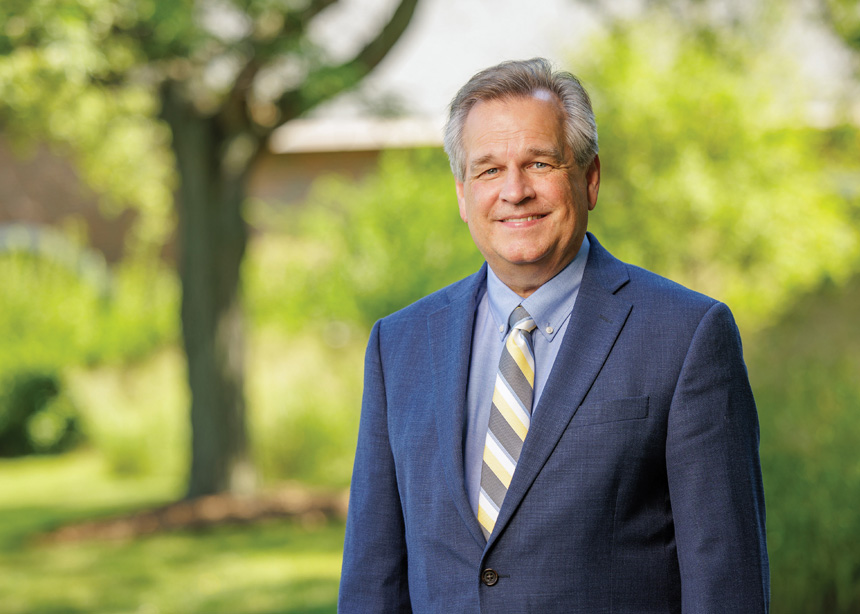
Rachel Miller Jacobs, associate professor of congregational formation, likes to remind students that they’re in a group of people who come from different contexts. That means they each have things to learn from their peers and they each have things to teach their peers.
“I keep encouraging myself, my colleagues, my students, to think of all our conversations as first drafts,” Miller Jacobs says. “Let’s get better at having these conversations. If it doesn’t go well, let’s take a moment at the end to figure out what didn’t work.”
The goal of any discussion is not for everyone to agree, she adds. The goal is to conduct the conversation with respect for everyone involved. People don’t need to be weak about their convictions, but they do need to have intellectual humility.
Boshart points out that AMBS has “a deeper diversity” than most Mennonite congregations. One of the things that keeps the seminary’s community working at respectful dialogue, he says, is that everyone has something tangible at stake. For students, it might be the tuition they are paying, or it might be the distance they have travelled to be at the seminary.
Boshart observes that Mennonite Church USA and Mennonite Church Canada congregations seem to miss a sense of what’s at stake when members leave because they disagree with each other.
“It seems to me in our local congregations, where division is happening, we don’t ponder what we really have at stake in this relationship,” he says. “Surely some of that has to do with forgetting or not affirming the belovedness of the other and [forgetting] the promises we made to each other in baptism.”
He adds that creating a globally connected community where people from different backgrounds can come together for respectful discussions is something that other Mennonite post-secondary institutions, like Canadian Mennonite University and Conrad Grebel University College, are working at, too.
He also thinks that what AMBS is doing has applications beyond the seminary’s walls. Miller Jacobs agrees.
“This has relevance for what happens in our neighbourhoods, local politics, soccer games people are playing. Our capacity to deal well with other people is huge,” she says. “In our congregations, we could help each other be more Jesus-y in all the places we show up—being clear about our convictions and also willing to meet people where they are.”


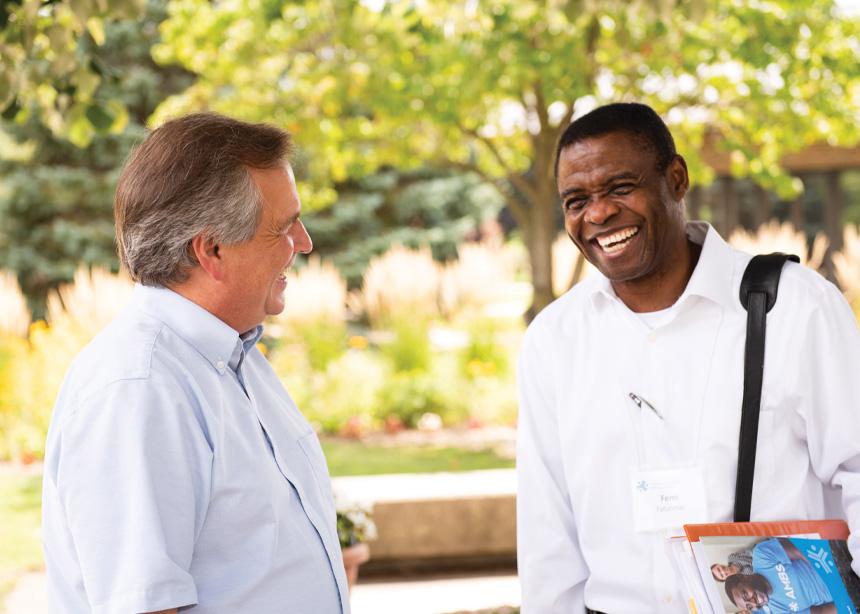

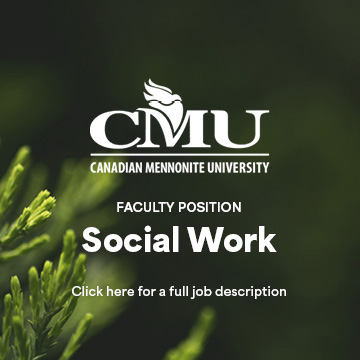

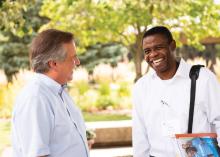
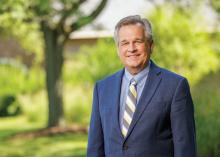
Comments
I am impressed, delighted, and so encouraged by what AMBS is doing and the example they are setting. I was a student at AMBS in 2000 for a brief time and have continued to appreciate the wisdom of the faculty and students. Thank you for this hopeful and practical way of experiencing dialogue in times of disagreement .
Add new comment
Canadian Mennonite invites comments and encourages constructive discussion about our content. Actual full names (first and last) are required. Comments are moderated and may be edited. They will not appear online until approved and will be posted during business hours. Some comments may be reproduced in print.